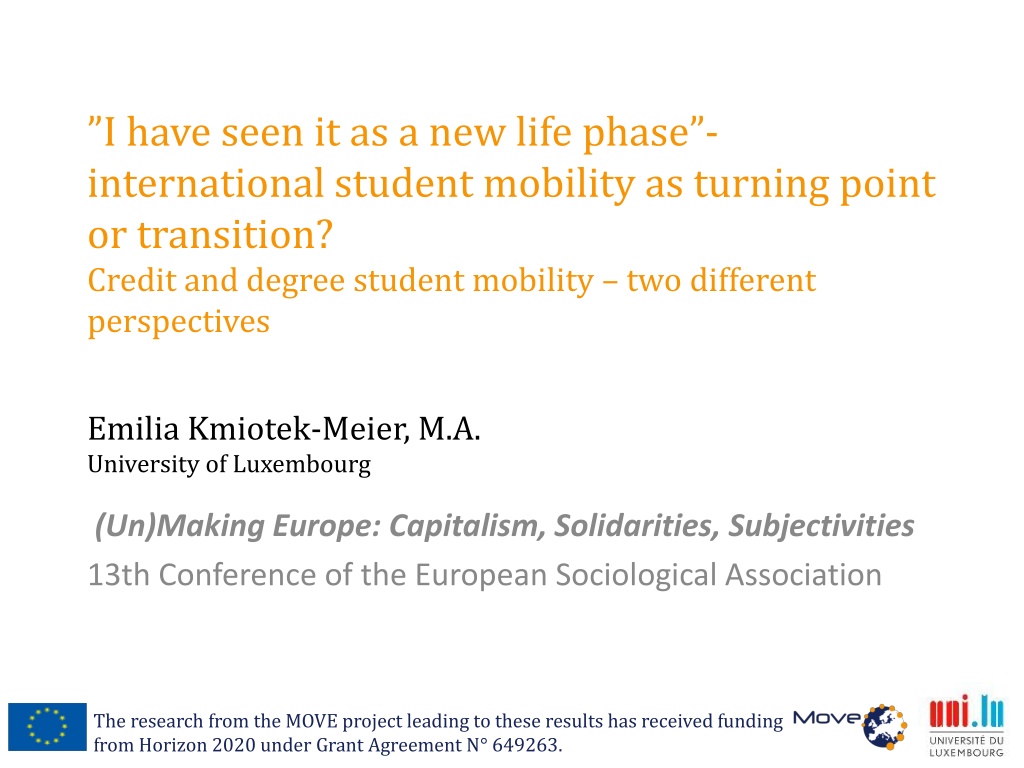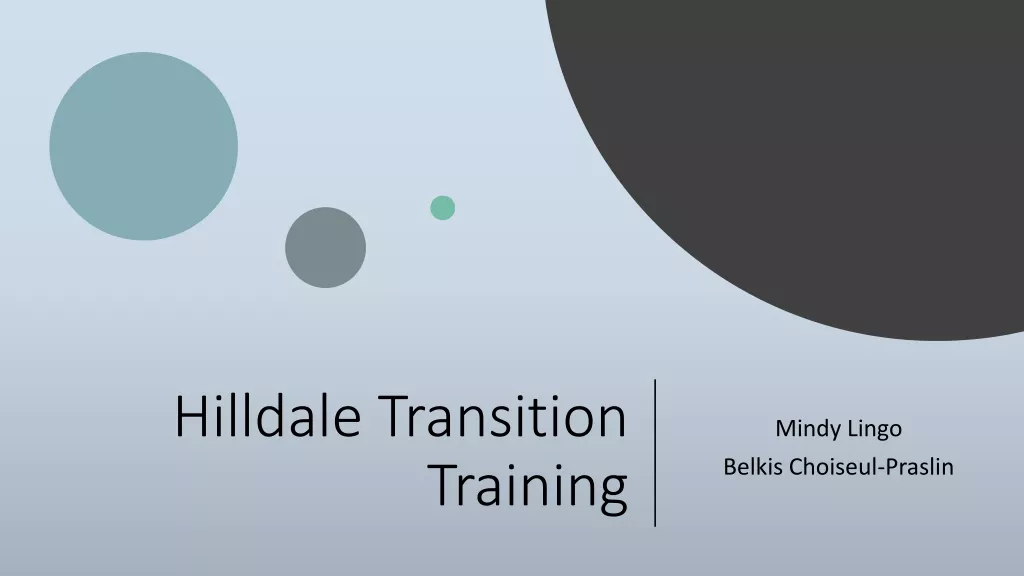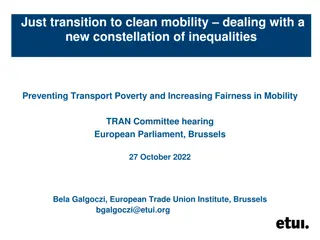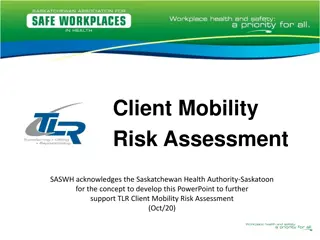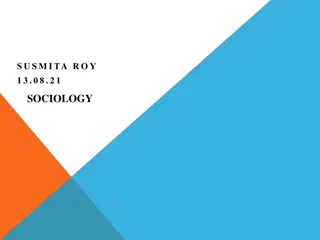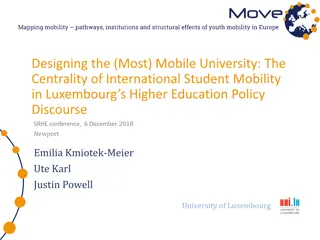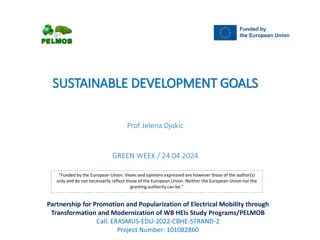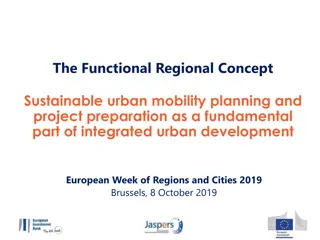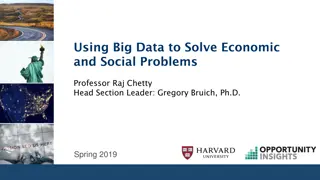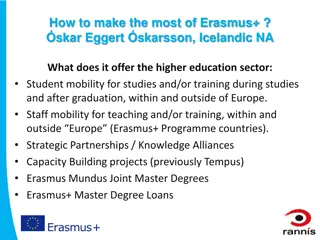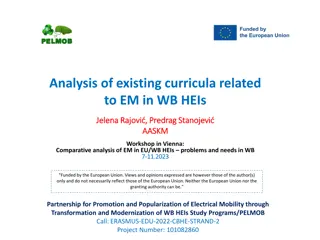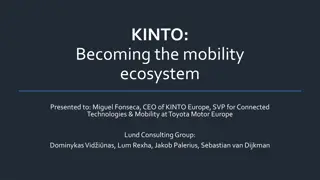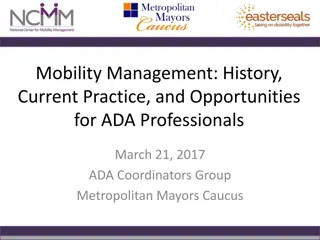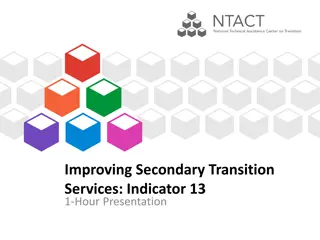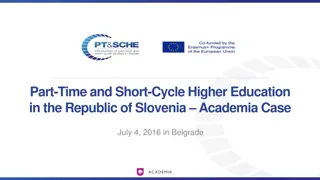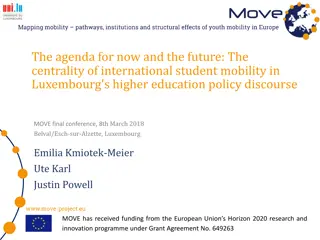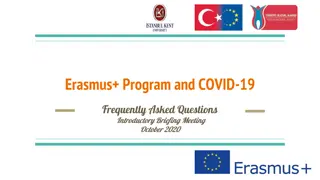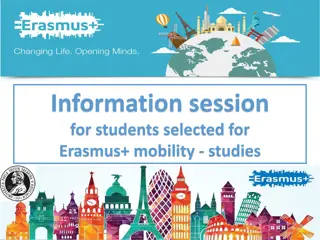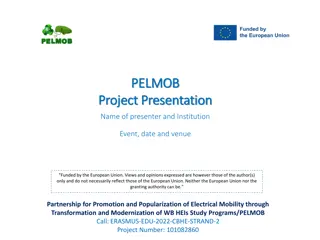Exploring Student Mobility and Transition in Higher Education
The research delves into the phenomenon of student mobility in higher education, analyzing it as a pivotal transition or turning point in a student's academic journey. Through the comparison of credit and degree student mobility perspectives, the study examines factors influencing international student mobility, experiences, and implications for employability. The focus is on understanding the dynamics of transitioning between educational programs abroad, particularly within the EU context where credit mobility is prevalent. The research also highlights the significance of intercultural transitions and the intricate nature of life course perspectives in analyzing student mobility.
Download Presentation

Please find below an Image/Link to download the presentation.
The content on the website is provided AS IS for your information and personal use only. It may not be sold, licensed, or shared on other websites without obtaining consent from the author. Download presentation by click this link. If you encounter any issues during the download, it is possible that the publisher has removed the file from their server.
E N D
Presentation Transcript
I have seen it as a new life phase- international student mobility as turning point or transition? Credit and degree student mobility two different perspectives Emilia Kmiotek-Meier, M.A. University of Luxembourg (Un)Making Europe: Capitalism, Solidarities, Subjectivities 13th Conference of the European Sociological Association The research from the MOVE project leading to these results has received funding from Horizon 2020 under Grant Agreement N 649263.
Overview I. Student mobility II. Transition / Turning point / Trajectory / Sequence III. Data & Analysis IV. Findings -> Degree and credit student mobility in comparison V. Summary / Outlook 2
I.a Student mobility student mobility degree mobility credit mobility part of programme abroad complete programme abroad In the EU more research on credit mobility (ERASMUS) Main lenses: factors influencing ISM (migration theories), students experiences, students employability (social inequalities, knowledge flows, social capital, mobility capital) Not explicitly analysed from the life course perspective so far If transition than rather as intercultural transition (Rienties & Jindal-Snape 2016) 3
II.a Transition / Turning point Transition -> change of status Turning point -> change in the trajectory direction Trajectory -> links life events and transitions to an entity (Elder 1985; Sackmann and Wingens 2001; Sackmann 2007) 4
II.b Sequence Sequence -> between a transition and a trajectory Types of sequences by Sackmann and Wingens (2001) In-between status A -> B -> A A: work, B: holiday Changing status A -> B -> C A: education, B: work, C: unemployment Bridge-status A -> AB -> B A: work fulltime, AB: work part-time, B: no work Following status A -> B -> AB A: work fulltime, B: no work, AB: work part-time End of status A -> B B: is the definitive status, e.g. retirement (Sackmann and Wingens 2001) 5
III.a Student mobility in Luxembourg 2003 foundation of the University of Luxembourg degree mobility from Luxembourg 75 % of all enrolled in tertiary education study abroad mainly DE, FR, BE credit mobility from Luxembourg an obligatory semester abroad for undergraduates mainly other EU-countries almost 100% student mobility from Luxembourg 6
III.b Data overview Data overview Data collection from October 2015 until April 2017 Instrument Semi-structured interview Target group Outgoing mobility: nationality or A-Level from Luxembourg Study type Credit: 6 / Degree: 8 = 14 Destination Germany (5), Belgium (4), Austria (3), France (3), England (2), Holland (1) -> Ba/Ma/credit in different countries Gender Female: 8 / Male: 6 Programme Humanities: 11 / Technical & Economical sciences: 3 7
III.c Analysis before during after st mob st mob st mob in focus -> student mobility sequence of credit and degree mobile students I: analytical distinction between diiferent trajectories (housing, eductaion, etc.) II: bring the dimensions togehter and analyse the interdependencies 8
IV.c Findings strive for independence >> interview parts removed << 9
IV.c Housing - tension >> interview parts removed << 10
IV.d Findings degree >> interview parts removed << 11
V.b Outlook 1) Interdependencies between different levels -> all plays a role 2) Different types of student mobility -> different types of experience / transitions / turning points -> credit better at the end of the study? 3) Mobility always good? -> a matter of timing? (Walther et al. 2002) 12
References Elder, Glen H. 1985. Perspectives on the Life Course. In Life Course Dynamics. Trajectories and Transitions, 198-1980, edited by Glen H. Elder, 23 49. Ithaca and London: Cornell University Press. Elder, Glen H. 1974. Children of the Great Depression. Social Change in Life Experience. Chicago, London: The University of Chicago Press. Rienties, Bart, and Divya Jindal-Snape. 2016. Multiple and Multi-Dimensional Transitions of International Students to Higher Education. A Way Forward. In Multi-Dimensional Transitions of International Students to Higher Education, edited by Divya Jindal-Snape and Bart Rienties, 259 282. New York: Routledge. https://www.routledge.com/Multi-dimensional-Transitions-of-International- Students-to-Higher-Education/Jindal-Snape-Rienties/p/book/9781138890909. Sackmann, Reinhold. 2007. Lebenslaufanalyse und Biografieforschung: eine Einf hrung. Wiesbaden: VS Verlag f r Sozialwissenschaften. Sackmann, Reinhold, and Matthias Wingens. 2001. Theoretische Konzepte des Lebenslaufs: bergang, Sequenz und Verlauf. In Strukturen des Lebenslaufs: bergang - Sequenz - Verlauf, edited by Reinhold Sackmann and Matthias Wingens, 17 48. Weinheim: Juventa. Walther, Andreas, Stauber, Barbara, Biggart, Andy, du Bois-Reymond, Manuela, Furlong, Andy, L pez Blasco, Andreu, M rch, Sven and Pais, Jos Machado (eds). 2002. Misleading Trajectories Integration Policies for Young Adults in Europe? Opladen: Leske+Budrich. 13
Thank you for your attention! Contact: Emilia Kmiotek-Meier emilia.kmiotek@uni.lu University of Luxembourg Facult des Lettres, des Sciences Humaines, des Arts et des Sciences de l'Education Institute of Geography and Spatial Planning http://www.move-project.eu The research from the MOVE project leading to these results has received funding from Horizon 2020 under Grant Agreement N 649263. 14
